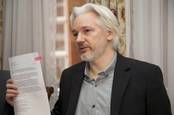This article is more than 1 year old
WikiLeaks boss Assange acted as a foreign spy, Uncle Sam exclaims in fresh rap sheet
Prosecutors try to paint a line between journos and internet dump lord in case with significant free speech implications
Julian Assange has been formally accused by the US government of breaking the Espionage Act, expanding the legal case against him and raising significant free speech issues.
The Department of Justice announced on Thursday it was effectively alleging the WikiLeaks founder acted as a foreign spy when he published hundreds of thousands of highly confidential US government reports, including war logs and diplomatic messages.
Australian-born Assange spent years holed up in the Ecuadorian embassy in London, England, after avoiding a probe into sexual assault allegations against him in Sweden. Then last month, Assange was dramatically handed over to the UK authorities by Ecuadorian officials: he was subsequently jailed for 50 weeks for breaching his bail conditions – conditions he broke by entering and refusing to leave the embassy for all those years. Meanwhile, Uncle Sam has started extradition proceedings against him to haul the WikiLeaker into an American court.
The US government initially charged Assange with conspiracy to commit computer intrusion, which could lead to a five-year jail sentence if convicted. These latest 18 charges [PDF] expand that case to the more serious issue of espionage, which would come with lengthier sentences, possibly even an effective life behind bars.
"If convicted, he faces a maximum penalty of 10 years in prison on each count except for conspiracy to commit computer intrusion, for which he faces a maximum penalty of five years in prison," Justice Department officials said.
What is unsaid is that the US government is seeking to make an example of a man who has been actively annoying the American authorities for over a decade.
Charging Assange under America's Espionage Act does, however, raise significant free speech questions, especially since Assange is likely to argue that his actions were protected under the nation's First Amendment.
The US government has never charged a journalist under the Espionage Act for publishing classified info, so there is no clear precedent over the extent to which a journalist's work – including receiving and publishing confidential documents – is protected by the First Amendment.
Journalist or spy?
However, the US government is likely to argue that Assange is not in fact a journalist. Which on one level is perfectly true – he does not act as a conventional journalist in that he doesn't produce or edit stories. But at the same time many of the methods he employs to get hold of information and make it publicly available are effectively the same, making it hard to draw a distinction.
The US government has had years to explore the issue and presumably feels it has a winnable case against the controversial figure. It is not clear where the Department of Justice will try to draw distinctions in the internet era between what the Fourth Estate does and what Assange and WikiLeaks have done.
The DoJ points to Assange's active assistance of former intelligence analyst Chelsea Manning in getting hold of the documents, and what it claims was an active decision to "injure" the United States.
"Assange was complicit… in unlawfully obtaining and disclosing classified documents related to the national defense," the announcement reads. "Assange conspired with Manning; obtained from Manning and aided and abetted her in obtaining classified information with reason to believe that the information was to be used to the injury of the United States or the advantage of a foreign nation."
It also noted that WikiLeaks published "the unredacted names of human sources who provided information to United States forces in Iraq and Afghanistan, and to US State Department diplomats around the world."
Again, this appears to be a distinction between WikiLeaks and the work of professional journalists, who went to some lengths to remove the names of individuals when they wrote about the same documents.
"Assange’s actions risked serious harm to United States national security to the benefit of our adversaries and put the unredacted named human sources at a grave and imminent risk of serious physical harm and/or arbitrary detention," the prosecutors' announcement states.
Whatever happens it is certain to be very carefully watched and will likely have very significant implications in future.
"The indictment of Julian Assange under the Espionage Act for publishing classified information is an attack on the First Amendment and a threat to all journalists everywhere who publish information that governments would like to keep secret," thundered the Committee to Protect Journalist's executive director Joel Simon.
"Press freedom in the United States and around the world is imperiled by this prosecution." ®

